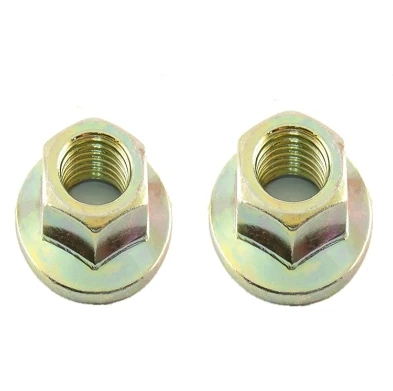Choosing the Right Flange Nuts for Your Project Needs and Applications
Dec . 03, 2024 15:58 Back to list
Choosing the Right Flange Nuts for Your Project Needs and Applications
Flange Nuts An Essential Component in Mechanical Fastening
In the world of mechanical engineering and construction, various components play crucial roles in ensuring the structural integrity and functionality of assemblies. One such often-overlooked component is the flange nut. This seemingly simple fastener has significant implications in a variety of applications, from heavy machinery to intricate devices. In this article, we will explore the design, applications, advantages, and importance of flange nuts in modern engineering.
What are Flange Nuts?
A flange nut is a type of nut that features a wide flange at one end. This flange acts as an integrated washer, distributing the load of the nut over a broader surface area. The design not only enhances the nut's load-bearing capacity but also helps to resist loosening from vibrations and other mechanical stresses. Flange nuts come in various designs and sizes, made from materials like steel, stainless steel, and even brass, depending on the required strength, weight, and corrosion resistance.
Design Features
Flange nuts are typically designed with a hexagonal shape, enabling them to be easily tightened or loosened using standard tools. The flange portion is often serrated or has a rough surface to provide additional friction, further preventing loosening during operation. The sizes and threading can vary to accommodate different bolt dimensions, making flange nuts versatile across numerous applications.
Applications of Flange Nuts
Flange nuts are widely used in numerous industries, including automotive, aerospace, construction, and manufacturing. In automotive applications, for instance, they are employed in securing components like exhaust systems, suspension parts, and engine assemblies. Their ability to withstand vibration and provide a secure grip makes them ideal for these high-stress environments.
In the construction industry, flange nuts play a critical role in securing structural components and ensuring stability. They are commonly used in conjunction with bolts to fasten steel beams, ensuring that buildings can withstand both static and dynamic loads. Furthermore, in the aerospace sector, flange nuts are crucial for assembling aircraft structures where reliability and safety are paramount.
Advantages of Flange Nuts
flange nuts

One of the primary benefits of using flange nuts is their ability to distribute load evenly. This quality helps prevent damage to the surfaces being fastened, thereby prolonging the life of both the nut and the materials it secures. Additionally, the integrated flange gives flange nuts a significant advantage over standard nuts, particularly in situations where space is limited.
Another notable advantage is the reduced assembly time. Flange nuts eliminate the need for separate washers, which can not only simplify the assembly process but also reduce the number of parts required. This can lead to cost savings in manufacturing and maintenance.
Furthermore, flange nuts offer enhanced resistance to vibration-induced loosening. Their design allows for a more secure grip on the surface of the material, making them particularly valuable in applications exposed to frequent movement or shock.
Importance in Modern Engineering
The importance of flange nuts in modern engineering cannot be overstated. As machinery and structures become more complex, the demand for reliable fastening solutions increases. Flange nuts provide engineers with a dependable option that satisfies many performance criteria, including strength, durability, and resistance to environmental factors.
Moreover, in an era where safety standards are stringent, flange nuts play a vital role in ensuring that assemblies remain secure throughout their operational life. While they may be small and often unnoticed, their contribution to the integrity and safety of various systems is significant.
Conclusion
In summary, flange nuts are an essential component in mechanical fastening that often garners less attention than it deserves. With their unique design, they provide effective load distribution, increased grip, and reduced assembly time across a multitude of applications. Their ubiquitous presence in industries such as automotive, aerospace, and construction showcases their versatility and importance.
As we continue to advance technologically, the demand for reliable and efficient fastening solutions like flange nuts will only increase. Understanding the value and functionality of such components not only helps engineers and builders in their work but also highlights the intricate relationships between various parts that make up the machines and structures we rely on every day. Whether in a bustling factory or a quiet workshop, the flange nut remains a steadfast player in the field of mechanical fastening, ensuring that everything stays securely in place.
Latest news
-
High-Quality Panel Stud Bolt Reliable Panel Stud Bolt Factory & Suppliers
NewsJul.08,2025
-
High-Precision Fine Thread Locknuts Manufacturer & Supplier Custom Solutions
NewsJul.08,2025
-
PH Imperial Stud Bolt – High Strength Fasteners from Leading Supplier & Factory
NewsJul.07,2025
-
High-Quality Allen Wrench Bolts Leading Factory, Company & Suppliers
NewsJul.07,2025
-
Wholesale Ball Stud Bolt - High Quality Supplier & Factory Price Reliable Wholesale Ball Stud Bolt Company
NewsJul.06,2025
-
High-Strength Alloy Bolts Manufacturer & Supplier Quality Alloy Fasteners Factory
NewsJul.06,2025
